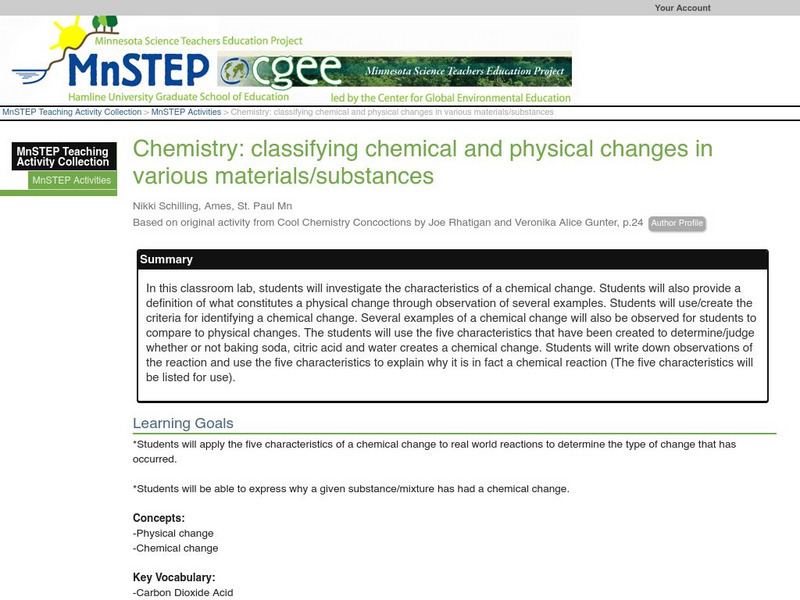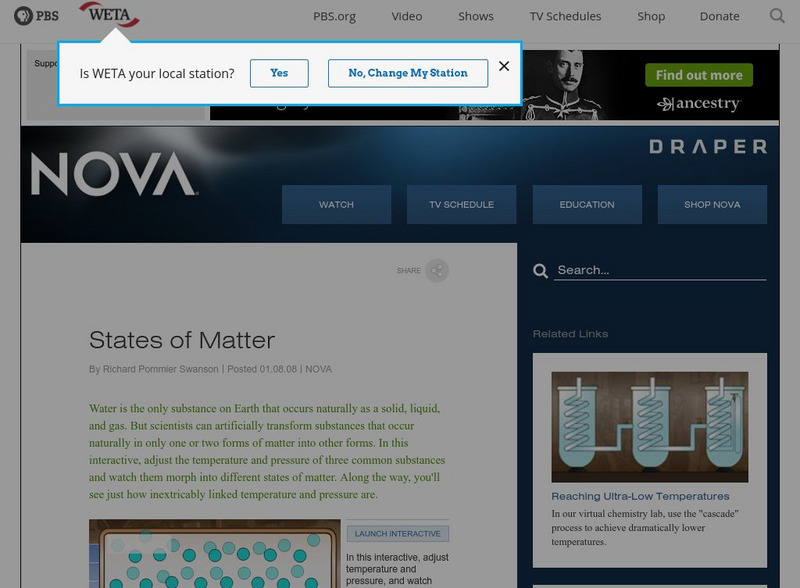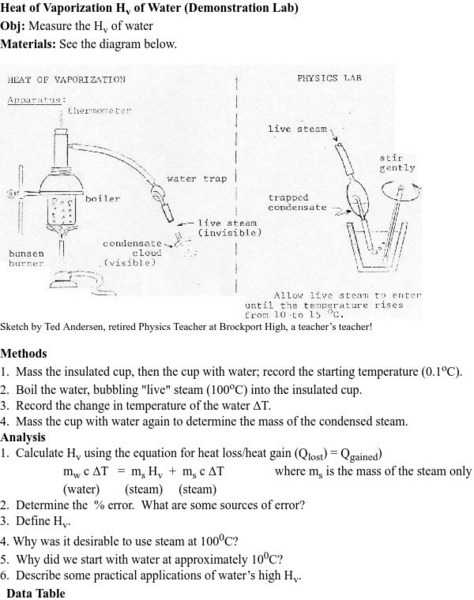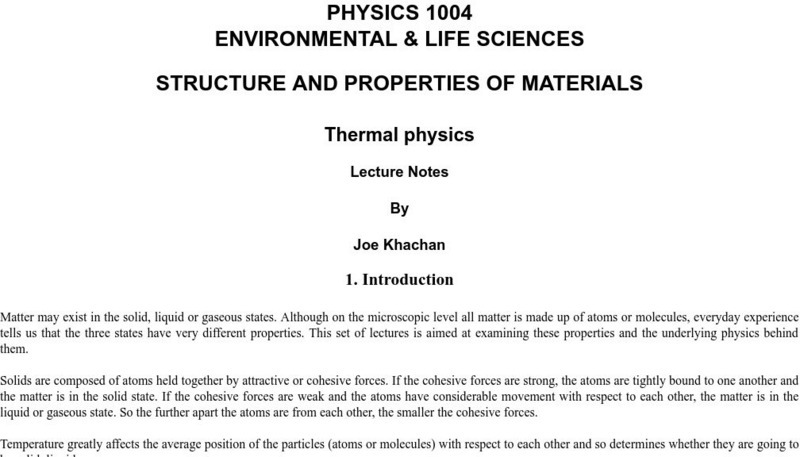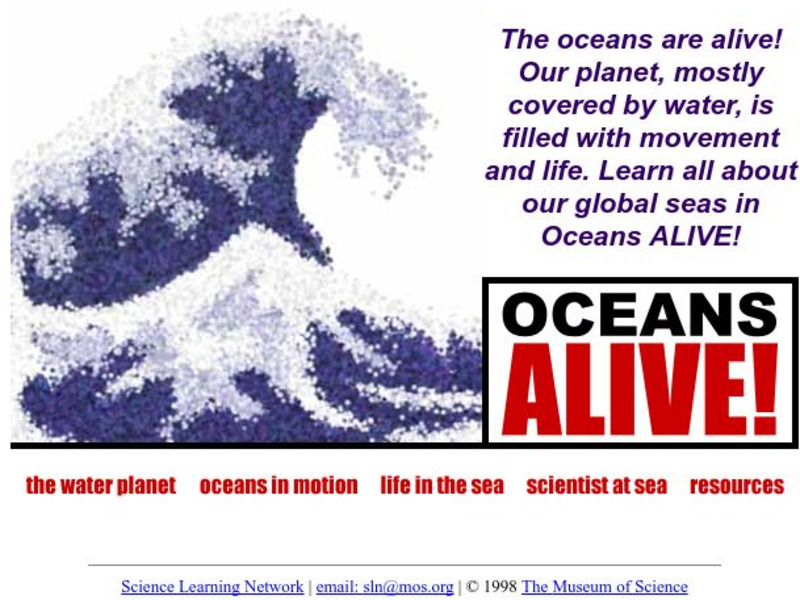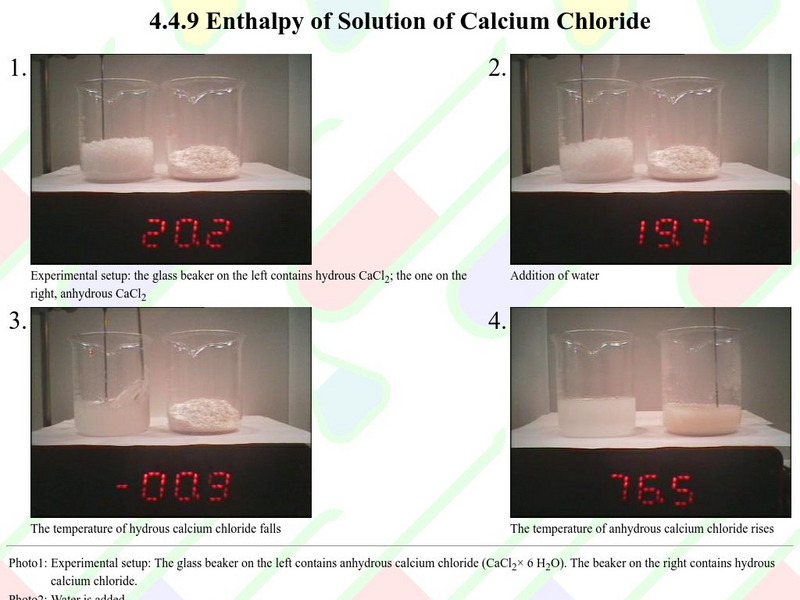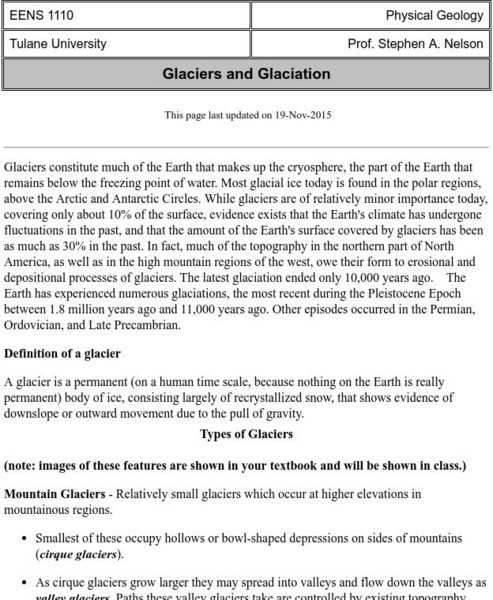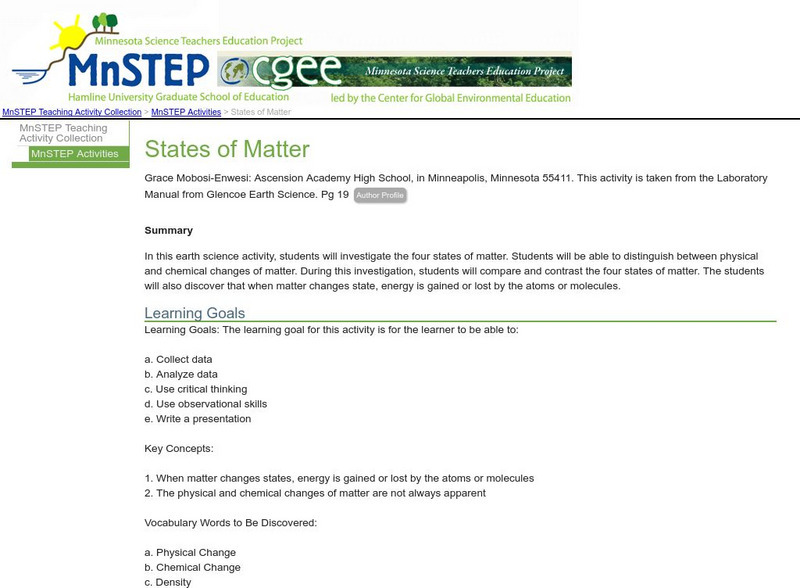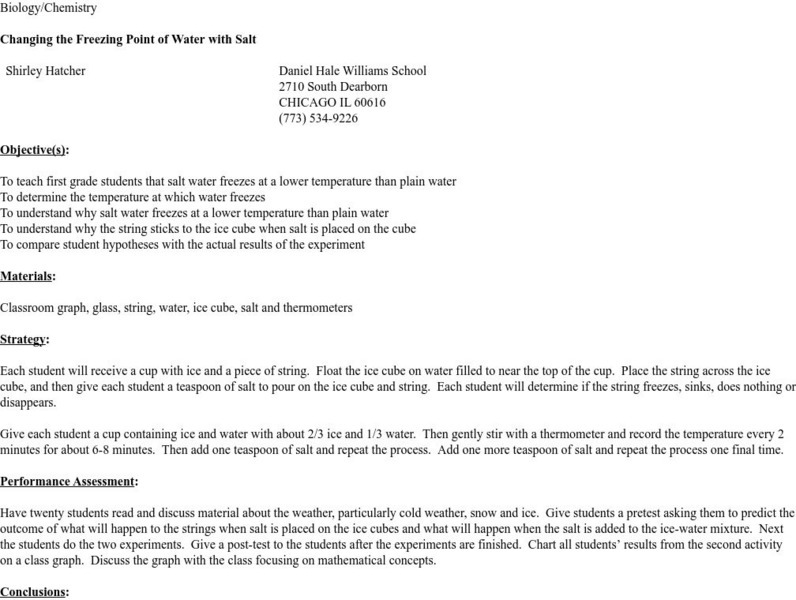Hi, what do you want to do?
American Chemical Society
Middle School Chemistry: Changing State: Melting
Discover the concept that energy transfer and molecular motion cause the change in state from a solid to a liquid. Also compare state changes of water to the state changes of other substances.
University Corporation for Atmospheric Research
Ucar: Just a Phase: Water as a Solid, Liquid, and Gas
This site helps students construct a model of the arrangement of water molecules when present as solid, liquid or gas. Includes background information, lesson plans, links to standards and assessment ideas.
Science Education Resource Center at Carleton College
Serc: Classifying Chemical and Physical Changes in Various Materials/substances
In this classroom lab, learners will investigate the characteristics of a chemical change. Students will also provide a definition of what constitutes a physical change through observation of several examples. Learners will use/create...
New York University
New York University: States of Water
Use this resource to learn about the three different phases of water; solid, liquid, and gas. What happens to water as it changes into a solid or gas? Includes short and easy to do activity.
American Chemical Society
Middle School Chemistry: Changing State: Freezing
Students investigate how low temperature causes water vapor to condense into a liquid and then freeze to form a solid.
NOAA
Noaa: More Than Salt in Salt Water [Pdf]
Realize that there is more in ocean water than just salt. Find out about the salinity of water and how changes in salinity may affect organisms living in the water.
Museum of Science
The Atom's Family: Phases of Matter
Help the Phantom choose a material and observe the changes at different temperatures in the molecule chamber. What happens to the elements or molecules as the temperature changes?
American Museum of Natural History
American Museum of Natural History: Grow Rock Candy
Students can carry out an investigation using sugar and water to determine whether heating or cooling a substance may cause changes that can be observed. This activity reinforces the ideas that the properties of materials can change when...
PBS
Pbs: Nova: Absolute Zero: States of Matter
This interactive allows you to explore the effect that temperature and pressure have on the changes in the states of matter. You can test these variables on carbon dioxide, hydrogen and water.
Other
Physics Labs/heat of Vaporization (Hv) of Water
A complete set of directions, notes and suggestions for a demonstration involving the determination of the heat of vaporization of water. Suitable for a student project or lab investigation.
Chem Tutor
Chem Tutor: States of Matter
A very descriptive site that allows students to understand the different states of matter at the atomic level. Also discusses the process of phase changes and displays phase change graphs. Thermochemistry is also touched upon for high...
University of Sydney (Australia)
University of Sydney: Structure and Properties of Materials/thermal Physics
An exhaustive set of "lecture notes" on various topics in thermal physics (including thermal expansion). Explanations are well done and more interesting than most. Includes both a mathematical and conceptual treatment of topics. Humor,...
Museum of Science
Museum of Science: Oceans Alive
There are links to the water planet, oceans in motion, life in the sea and resources. You will learn about the physical features of an ocean, changes in the ocean and the water cycle.
Center of Science and Industry
Cosi Columbus: A Swell Activity With Beans [Pdf]
Learn about absorption in this hands-on science experiment. Includes full list of materials, procedures, and scientific explanation of what happens to different types of beans as they soak in water in a test vial.
Other
University of Siegen: Enthalpy of Solution
This resource provides a physical reaction. Hydrous and anhydrous calcium chloride react with water to produce physical exothermic and endothermic reactions.
CK-12 Foundation
Ck 12: Physical Science: Boiling
A module reviewing over how vaporization occurs and its difference from evaporation. Also, review over the definition of boiling point. Module includes a video, pictures, explanation, and review questions.
Other
Tulane University: Physical Geology: Glaciers and Glaciation
Lots of information here about glaciation, types of glaciers, the formation of glacial ice, changes in glacier size, how glaciers move, glacial erosion, landforms produced by glaciers, glacial deposition and drift, effects of glaciation...
Science Education Resource Center at Carleton College
Serc: Mn Step: States of Matter
In this activity, students investigate physical and chemical changes in the states of matter for water. They collect data and record their observations.
Science and Mathematics Initiative for Learning Enhancement (SMILE)
Smile: Changing the Freezing Point of Water With Salt
This lesson plan teaches first grade students basic chemistry and physics principles--that saltwater freezes at a lower temperature that plain water.
Physics Aviary
Physics Aviary: Guided Specific Heat Lab
This lab is designed to have students learn how to calculate the specific heat of a liquid based on the temperature changes that occur when hot water is added to the liquid.
CK-12 Foundation
Ck 12: Physics Simulation: Electric Ice Sheet
Balance electric charges to prevent Tommy from slipping into icy water. You are presented with 4 particles, each with a charge value. Using the plus/minus scrollbar, you can change the value of the highlighted charge. Then press the play...
Physics Aviary
Physics Aviary: Guided Specific Heat of Solid Lab
This lab is designed to have students learn how to calculate the specific heat of a solid based on the temperature changes that occur when a hot solid is added to cold water.
University of Maryland
University of Maryland: Boiling Water by Pumping
A page from the University of Maryland Physics Lecture Demonstration Facility. Provides directions for a teacher demonstration which utilizes a Bell jar and vacuum pump to show the dependency of boiling point upon pressure. Shows...
Physics Central
Physics Central: Physics in Your Glass: Racing Molecules
An easy experiment for demonstrating and exploring molecule movement requiring common household items: two glasses, two dark colors of food coloring, and warm and cold water. A few variations to the experiment will have students using...







